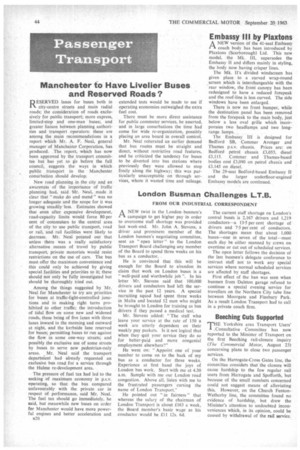London Busman Challenges L.T.B.
Page 46

If you've noticed an error in this article please click here to report it so we can fix it.
FROM OUR INDUSTRIAL CORRESPONDENT
Pl.A NEW twist in the London• busmen's campaign to get higher pay in order to overcome staff shortage was provided last week-end. Mr. John A. Stevens, a driver and prominent member of the London busmen's negotiating committee, sent an "open letter" to the London Transport Board challenging any member of the Board to spend three weeks on his bus as a conductor, ,
He is convinced that this will be enough for the Board to abandon its claim that work on London buses is a "well-paid and worthwhile job ". In his letter Mr. Stevens said that 100,000 drivers and conductors had left the service in the past 12 years. A special recruiting squad had spent three weeks in Malta and located 12 men who might he brought to London for training as bus drivers if they passed a medical test.
Mr. Stevens added: "The staff who leave your service at the rate of 150 a week are utterly dependent on their weekly pay packets. Is it not logical that when they quit your service they do so for better-paid and more congenial employment elsewhere?"
He went on: "Appoint one of your number to come on to the back of my bus as a conductor for three weeks. Experience at first hand the joys of London bus work. Start with me at 4.30 a.m. Sample with me our London road congestion. Above all, listen with me to the frustrated passengers cursing the name of London Transport."
He pointed out "in fairness" that whereas the salary of the chairman of London Transport is about £163 a week, the Board member's basic wage as his conductor would be £11 12s. 6d. The current staff shortage on London's central buses is 2,167 drivers and 1,219 conductors—a 13.5 per cent shortage of drivers and 7-5 per cent of conductors. The shortages mean that about 1,000 buses—one in seven of the total—must each day be either manned by crews on overtime or cut out of scheduled services.
The open letter follows the decision of the last busmen's delegate conference to instruct staff not to work any special services where normal scheduled services are affected by staff shortages.
First effect of the ban was seen when busmen from Dalston garage refused to continue a special evening service for travellers on the Northern City tube line between Moorgate and Finsbury Park. As a result London Transport had to call in a private coach firm.
Beeching Cuts Supported THE Yorkshire area Transport Users' ,Consultative Committee has now reported to the Minister of Transport on the first Beeching rail-closure inquiry (The Commercial Motor, August 23) concerning plans to close two passenger services.
On the Harrogate-Cross Gates line, the committee considers that .the closure will cause hardship to the few regular rail users from Harrogate and Spofforth, but because of the small numbers concerned could not suggest means of alleviating this. However, on the Church FentonWetherby line, the committee found no evidence of hardship, but drew the Minister's attention to undoubted inconveniences which, in its opinion, could be caused by withdrawal of the rail service.




















































































































